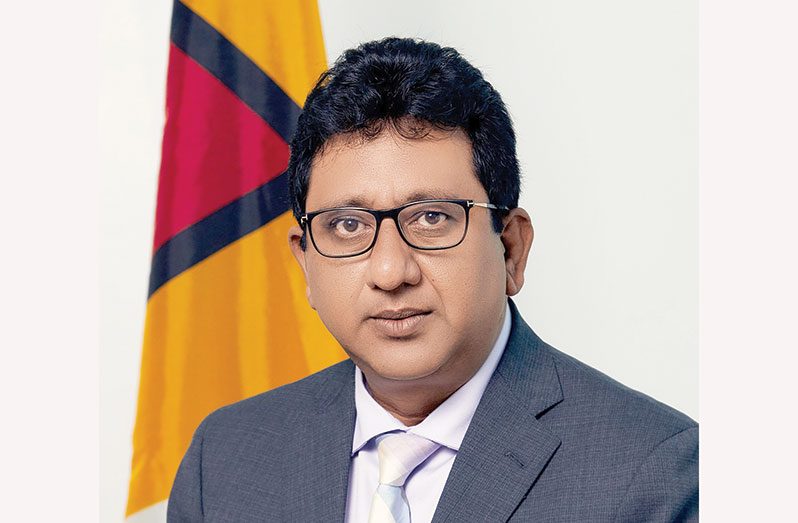— and is destined to fail, Attorney-General submits to court
By Richard Bhainie
THERE is the absence of material facts, and no foundation is laid in the Elections Petition, 88 of 2020, to establish any grounds upon which the March 2, 2020, Elections can be vitiated, and, in that regard, the petition is destined to fail.
This was submitted and expounded upon by Attorney-General and Minister of Legal Affairs, Anil Nandlall, S.C, in his submissions to the High Court of the Supreme Court of Judicature in the matter of the Elections Petition, 88 of 2020.
Petitioners Claudette Thorne and Heston Bostwick, in their submissions in the matter, contended that Section 22 of the Election Laws (Amendment) Act 2000 is unconstitutional and Order 60 of 2020 which authorised the recount process, is invalid, null, void and of no effect.
They are also contending that the Returning Officers’ Electoral District Declarations could not have been set aside and the Guyana Elections Commission’s (GECOM) actions were unlawful and encroached upon the High Court Jurisdiction under Article 163 of the Constitution.
Order 60 was created by virtue of Article 162(1) of the Constitution and Section 22 of the Election Laws Amendment Act 2000 in order to resolve irregularities, anomalies and discrepancies before declaring the results of the elections.
“As I apprehend it, Learned Counsel posits that Parliament, in enacting Section 22, so far as it confers law-making powers on GECOM, it offends Article 65 and Article 170 of the Constitution,” Nandlall submitted to the court.
WITHOUT BASIS
The Attorney-General listed a plethora of legal precedents and authorities to explain that, in enacting Section 22, the Guyana Parliament exercised a long-established legislative power and the contention that it violated the separation of powers doctrine is untenable and without basis.
“The Petitioners contend that Section 22 of the Election Laws (Amendment) Act offends the doctrine of separation of powers because it conflicts with Article 170 (1) and (2) of the Constitution,” Nandlall submitted.
The Attorney-General went on to explain that Article 170 (1) stipulates that Parliament is to make laws by bills, which are to be assented to by the President. Article 170(6) dictates that a bill shall not become law unless it has been duly passed and assented to.
He noted, however, that Section 22 of the Election Laws (Amendment) Act speaks to an order, which is not, in practice or law, established by bills. Further, they do not require the assent of the President before becoming law.
“It is therefore submitted, that the Parliament of Guyana, when acting within the limits of the Constitution, has, and was intended to have, plenary legislative powers, which permits it to, when it decides, to authorise public authorities to amend primary legislation by Order,” Nandlall submitted.
In addressing the issue whether the Returning Officers’ Electoral District Declarations could have been set aside, the Attorney-General noted that this issue is premised on a supposition that Order 60 is ultra vires and that Order 60 cannot collide with the Representation of the People Act 1964 (ROPA).
In his comprehensive submission, Nandlall sought to establish that Order 60 is not ultra vires and that a combination of Article 162 (1)(b) and Section 22 of the ELAA aggregate to confer power upon GECOM to depart from the ROPA, and even amend the ROPA in certain instances.
SIMPLY AND MANIFESTLY WRONG
He further noted that to construe Order 60 as trespassing on the exclusive jurisdiction of the High Court to determine whether an election has been lawfully conducted, or affected by any unlawful act or omission as provided for by Article 163 of the Constitution, is simply and manifestly wrong.
Article 163 (1) of the Constitution speaks to the jurisdiction of the High Court to determine questions relating to membership of the National Assembly and elections.
Citing the case of ‘Esther Perreira v Chief Elections Officer et al 1998 No.36-P’ Nandlall noted that in the case Justice Singh (ret’d) formulated that there is a two- pronged approach in determining whether an election should vitiated.
In the case, Justice Singh (ret’d) explained that a distinction must be made between the unlawful conduct of an election and an unlawful act or omission which has affected or may have affected the result of the election.
“It cannot be disputed that the conduct of the March 2nd, 2020, Election is not being challenged by this Petition. This Petition, therefore, falls within the second category of challenge … That unlawful act, is Order 60 and the re-count process which flowed therefrom,” Nandlall submitted.
He explained that the petition failed to establish any satisfactory evidence that Order 60 and the re-count process affected the result of the elections as all that the re-count did was to re-count ballots casted on voting day.
“There is no evidence before this court impugning those ballots so as to discount them from being re-counted. There is no evidence of any variation between the first count which took place at the end of poll and the count which took place under Order 60,” Nandlall submitted.
“Indeed, even if it is found that the re-count and Order 60 are unlawful there is still no evidence that either or both of them materially affected the results of the elections,” he added.




.png)









